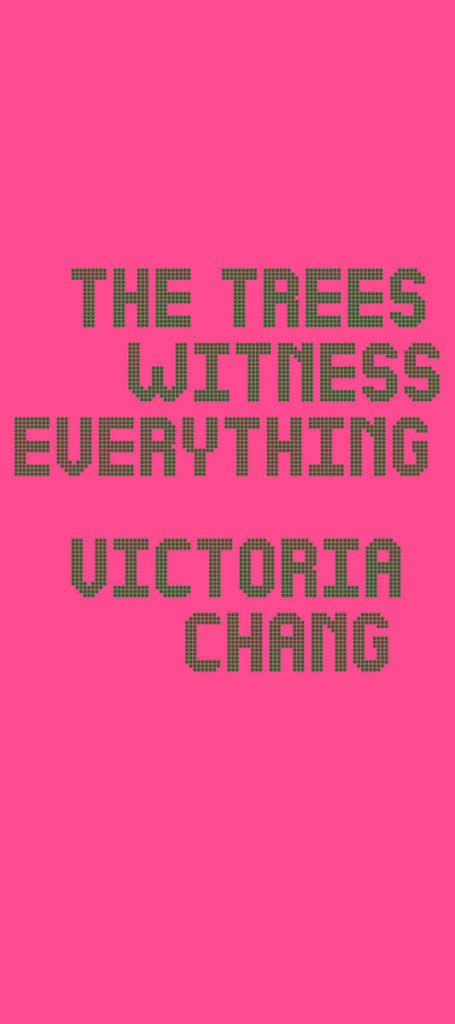
$17 (Paperback)
The Trees Witness Everything by Victoria Chang
The first thing you will notice about The Trees Witness Everything by Victoria Chang is the shape of the book. An oddly tall, unusually narrow volume, it sticks out on any bookshelf you put it, among any stack of books it lies. It feels odd in the hands, as if it is both too much to hold but not enough to grasp. And when you do open it, another detail will strike you on the very first page: there are two poems, not one. A choice that defies the usual formatting of volumes of poetry, where each poem starts its own page. When I first opened the book, these details gloriously snapped together: the title of the book, its form, its layout. This was a collection about the small, the quotidian, the environmental, and every aesthetic decision, from the dimensions of the pages to the formatting of poems, was chosen in service of communicating that message.
Just as the narrow columns of text in Chang’s last book, Obit, reminded the reader of tombstones, newspaper columns, and obituaries, the doubled poems and the odd book shape remind us of the trees, the value of the paper made from their flesh, and the omnipresence of our dependence on nature. Here we leave the formal mastery revealed in the shape of the book and enter into the formal mastery of the poems themselves. Because the reverence for the trees and the economy of paper can only exist due to the concision of the poetry. To be precise, the concision necessitated by the short, syllabic forms that are explored throughout the volume, all forms from Japanese court poetry and grouped under the name of waka.
Readers unfamiliar with the history of Japanese court poetry will probably look at the short, 3-line poems in the first couple pages and be disappointed that none of them are haikus. But the haiku is only one of a large family of Japanese forms, and it’s the less common ones (at least, in the English language) that take the spotlight here. As the poems progress, certain forms persist more than others, the eye beings to recognize lines of 5 syllables and lines of 7, and all the sudden the complexity of the forms are made clear! It feels like going to school in the best of ways: The Trees Witness Everything can both introduce you to the katuata, the sedoka, the bussokusekika and give you the tools to recognize the virtuosic pushing, pulling, and breaking of those forms in the final sections of the collection.
But all this talk of form only sets up the wonderful content of the book. The topics of the poems are varied but are unified in their mundanity. Nature, the weather, relationships, animals are the more common objects of description. And the concision of the forms and the precision of the language yield a kind of delightfully fresh, contemporary revisiting of Imagist feeling. This is just to say that the exciting enjambments and the novel non-sequiturs created by the form give the everyday objects a richness, a depth, that only a poet as brilliant and precise as Victoria Chang can draw out. And The Trees Witness Everything is exactly that kind of drawing.
–Matthew Mason